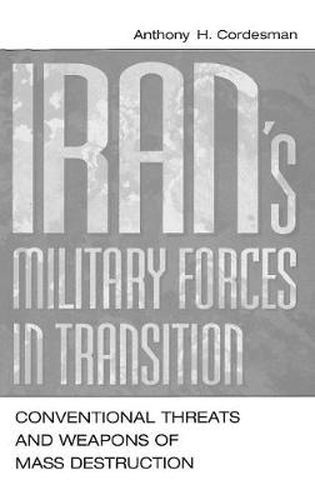Readings Newsletter
Become a Readings Member to make your shopping experience even easier.
Sign in or sign up for free!
You’re not far away from qualifying for FREE standard shipping within Australia
You’ve qualified for FREE standard shipping within Australia
The cart is loading…






Iran today is still struggling with the legacy of its own Islamic revolution, and is deeply divided between the moderates who enjoy broad public support and the conservatives who control the levers of power. The mixed policies that result are reflected in Iran’s ambivalent military posture. In recent years, Iran has only conducted a limited build-up of its armed forces and has cut defence spending and arms imports. On the other hand, Iran has developed a carefully focused programme that threatens shipping in the lower Gulf and the world’s oil exports. It has strengthened its capability for unconventional warfare and continues to be a significant proliferator, setting up indigenous military industries and developing a greater ability to import weapons. In this authoritative analysis of interest to Middle Eastern specialists and military affairs experts alike, Anthony Cordesman concludes that the continuation of Iran’s current defensive security posture depends as much on these economic factors as on the outcomes of domestic political rivalries. Iran may eventually limit any military expansion to a necessary defensive strength and set strategic goals for itself that are compatible with the legitimate interests of other nations, or it may choose a more aggressive course. Regardless of the ultimate outcome, argues Cordesman, it does no good to either demonize or excuse Iranian policies. Instead, the United States and other nations with interests in the Middle East and Central Asia need to deal realistically with Iran as a reemerging regional power.
$9.00 standard shipping within Australia
FREE standard shipping within Australia for orders over $100.00
Express & International shipping calculated at checkout
Iran today is still struggling with the legacy of its own Islamic revolution, and is deeply divided between the moderates who enjoy broad public support and the conservatives who control the levers of power. The mixed policies that result are reflected in Iran’s ambivalent military posture. In recent years, Iran has only conducted a limited build-up of its armed forces and has cut defence spending and arms imports. On the other hand, Iran has developed a carefully focused programme that threatens shipping in the lower Gulf and the world’s oil exports. It has strengthened its capability for unconventional warfare and continues to be a significant proliferator, setting up indigenous military industries and developing a greater ability to import weapons. In this authoritative analysis of interest to Middle Eastern specialists and military affairs experts alike, Anthony Cordesman concludes that the continuation of Iran’s current defensive security posture depends as much on these economic factors as on the outcomes of domestic political rivalries. Iran may eventually limit any military expansion to a necessary defensive strength and set strategic goals for itself that are compatible with the legitimate interests of other nations, or it may choose a more aggressive course. Regardless of the ultimate outcome, argues Cordesman, it does no good to either demonize or excuse Iranian policies. Instead, the United States and other nations with interests in the Middle East and Central Asia need to deal realistically with Iran as a reemerging regional power.